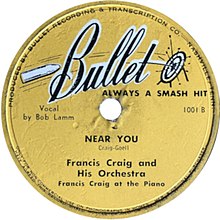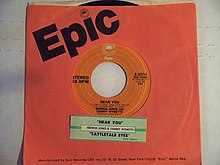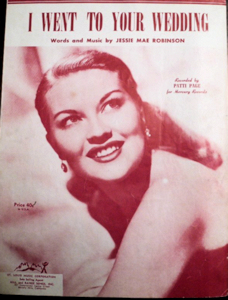
"I Went to Your Wedding" is a popular song written and composed by Jessie Mae Robinson and published in 1952.
"Buttons and Bows" is a popular song with music written by Jay Livingston and lyrics by Ray Evans. The song was published on February 25, 1948 by Famous Music Corp., New York. The song was written for and appeared in the Bob Hope and Jane Russell film The Paleface and won the Academy Award for Best Original Song. It was originally written with an Indian theme, but was changed when the director said that would not work in the movie. It was a vocal selection on many radio programs in late 1948. It was reprised in the sequel, Son of Paleface, by Roy Rogers, Jane Russell and Bob Hope. In 2004 it finished #87 in AFI's 100 Years...100 Songs survey of the top tunes in American cinema.
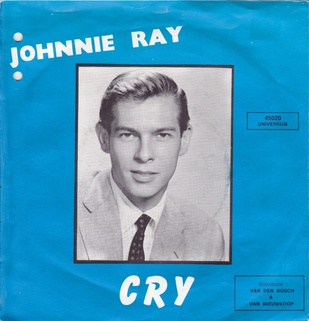
"Cry" is a 1951 popular song written by Churchill Kohlman. The song was first recorded by Ruth Casey on the Cadillac label. The biggest hit version was recorded in New York City by Johnnie Ray and The Four Lads on October 16, 1951. Singer Ronnie Dove also had a big hit with the song in 1966.
"Chattanoogie Shoe Shine Boy" is a popular song written by Harry Stone and Jack Stapp and published in 1950. It is the signature song of Red Foley who recorded it in late 1949. The song has been covered by many artists, including Bing Crosby, Frank Sinatra, and Faron Young who scored a hit with the song in 1959.

"Stand by Your Man" is a song recorded by American country music artist Tammy Wynette, co-written by Wynette and Billy Sherrill. It was released on September 20, 1968, as the first single and title track from the album Stand by Your Man. It proved to be the most successful record of Wynette's career, and is one of the most familiar songs in country music. The song was placed at number one on CMT's list of the Top 100 Country Music Songs.

"I'll Get By (As Long as I Have You)" is a popular song with music by Fred E. Ahlert and lyrics by Roy Turk that was published in 1928. Versions by Nick Lucas, Aileen Stanley and, most successfully, Ruth Etting, all charted in America in 1929.
"Sweet Dreams" or "Sweet Dreams (of You)" is a country ballad, which was written by Don Gibson. Gibson originally recorded the song in 1955; his version hit the top ten of Billboard's country chart, but was eclipsed by the success of a competing recording by Faron Young. In 1960, after Gibson had established himself as a country music superstar, he released a new take as a single. This version also charted in the top ten on the country chart and also crossed over to the Billboard Hot 100, where it peaked at No.93. The song has become a country standard, with other notable versions by Patsy Cline and Emmylou Harris.
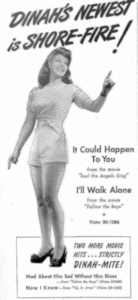
"I'll Walk Alone" is a 1944 popular song with music by Jule Styne and lyrics by Sammy Cahn. The song was written for the 1944 musical film Follow the Boys, in which it was sung by Dinah Shore, and was nominated for the Academy Award for Best Original Song but lost to “Swinging on a Star”. Shore recorded the song in March as a single, which became her first #1 hit on the Billboard charts.

"Smoke! Smoke! Smoke! " is a Western swing novelty song written by Merle Travis and Tex Williams, for Williams and his talking blues style of singing. Travis wrote the bulk of the song. The original Williams version went to number one for 16 non-consecutive weeks on the Hot Country Songs chart and became a #1 hit in August 1947 and remained at the top of the "Best Sellers in Stores" chart for six weeks. It was written in 1947 and recorded on March 27, 1947, at Radio Recorders in Hollywood.
"(I Love You) for Sentimental Reasons" is a popular song written by Ivory "Deek" Watson, founding member of the Ink Spots and of the Brown Dots, and William "Pat" Best, founding member of the Four Tunes.
"Someday You'll Want Me to Want You" is a popular song published in 1944 by Jimmie Hodges. The song became a standard, recorded by many pop and country music singers.

"Oh Lonesome Me" is a popular song written and recorded in December 1957 by Don Gibson with Chet Atkins producing it for RCA Victor in Nashville. Released in 1958, the song topped the country chart for eight non-consecutive weeks. On what became the Billboard Hot 100, it peaked at No. 7. It was Gibson's only Top 10 hit on the pop chart. Its B-side was "I Can't Stop Loving You", which peaked at No. 7 on the C&W Jockey charts and became a standard song about unrequited love. The vocal backings on both songs were provided by the Jordanaires.
"There! I've Said It Again" is a popular song written and published by Redd Evans and David Mann in 1941. In early 1945, Vaughn Monroe and his Orchestra released Victor 20-1637, which reached the number one position on the Billboard's National Radio Airplay chart for five straight weeks, then no.2 for six more weeks, and a total run of 29 weeks. It finished 1945 as the no. 4 record of the year.
"I'll Hold You in My Heart (Till I Can Hold You in My Arms)" is a 1947 song by Eddy Arnold. The song was Eddy Arnold's third number one on the Billboard Juke Box Folk Records chart. "I'll Hold You in My Heart (Till I Can Hold You in My Arms)" spent 46 weeks on the chart and 21 weeks at number one. The song also served as Arnold's first crossover hit, peaking at number 22 on the Billboard Best Sellers in Stores chart.
"Singing My Song" is a song recorded by American country music artist Tammy Wynette, who co-wrote the song with Billy Sherrill and Glenn Sutton. It was released in March 1969 as the first single from her compilation album Tammy's Greatest Hits. The song was Wynette's fifth number one on the country charts as a solo artist. The single spent two weeks at number one and a total of fourteen weeks on the charts.

You Lay So Easy on My Mind is the thirty-fourth studio album by American pop singer Andy Williams, released in November 1974 by Columbia Records. The idea for this LP was mentioned in an interview with Williams in the November 3, 1973, issue of Billboard magazine that emphasized his desire to move away from recording albums of Easy Listening covers of hits by other artists, noting that he was "planning an album to be cut in Nashville with Columbia's high-flying country-pop producer, Billy Sherrill." The article coincided with the release of his first attempt to shift directions, Solitaire, which performed poorly. A return to the Easy Listening hits formula, The Way We Were, followed in the spring of 1974 but failed to even chart, so this next attempt to eschew soft rock songs leaned heavily on Country hits.

"I Can't Help It (If I'm Still in Love with You)" is a song written and originally recorded by Hank Williams on MGM Records. It hit number two on the Billboard country singles chart in 1951. In his autobiography, George Jones printed the first six lines of the song and stated, "Its lyrics couldn't be more simple - or profound."
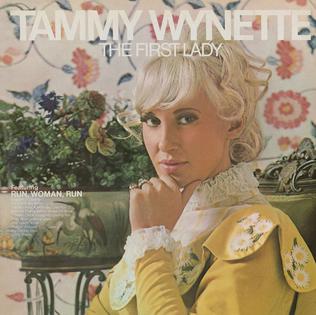
The First Lady is a studio album by American country artist, Tammy Wynette. It was released on October 5, 1970 via Epic Records and contained 11 tracks. It was the ninth studio album in Wynette's career. The disc featured both new material and covers of previously-recorded material. Many of the recordings featured on the disc centered around themes about housewives keeping their spouses happy. The First Lady reached positions on both the American country albums and pop albums charts. Its only single, "Run, Woman, Run", topped the country charts. The album was met with mixed reviews following its release.

"That's How Much I Love You" is a country music song written by Arnold, Fowler, and Hall, sung by Eddy Arnold, and released in 1946 on the RCA Victor label. In October 1946, it reached No. 2 on the Billboard folk chart. It was also ranked as the No. 10 record on the Billboard 1946 year-end folk juke box chart.
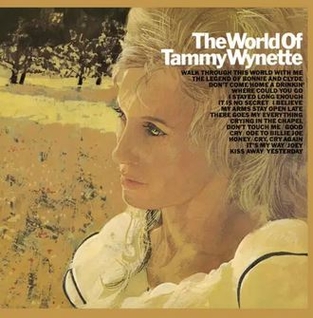
The World of Tammy Wynette is a compilation album by American country artist Tammy Wynette. It was released in May 1970 via Epic Records and contained 20 tracks of previously recorded material. The album comprised a series of recordings that originally appeared on Wynette's studio albums but were not issued as a singles. Some of the album's material were covers of songs first recorded by other music artists. It was originally issued on two separate discs and was later re-released in 2009. The World of Tammy Wynette appeared on both the Billboard country albums chart and the pop chart. The disc received mixed reviews from critics.
